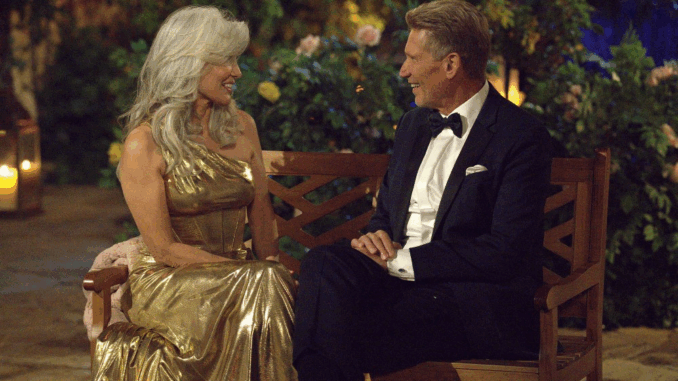
A new lens on love: Why The Golden Bachelor matters
The popularity of The Golden Bachelor is not just about entertainment—it’s about reshaping the narrative around love, companionship, and romance for older adults. For decades, aging and romance were viewed as mutually exclusive in mainstream media. Older adults—particularly seniors—were rarely depicted as active participants in the dating world. That changed with The Golden Bachelor.
This show became a cultural milestone, not just within the Bachelor franchise, but in the broader landscape of dating culture. By putting older adults at the center of the dating journey, The Golden Bachelor helped to redefine what it means to find love later in life. The show opened a conversation about aging, desire, and the second-chance opportunities that everyone deserves, regardless of age.
Normalizing dating for seniors
One of the most powerful aspects of The Golden Bachelor is how it normalized dating for older adults. Historically, society has often stigmatized older individuals who are still actively seeking companionship or love, assuming that the desire for romance naturally wanes with age. But The Golden Bachelor shattered this myth, proving that older individuals not only seek love—they crave it.
Viewers saw Gerry Turner, a man in his 70s, embarking on a journey full of highs and lows, deeply vulnerable as he opened his heart to the possibility of new love after the loss of his wife. It was an emotional ride for the audience, and one that resonated with older adults who are often overlooked in terms of their romantic aspirations.
The show demonstrated that there is no “expiration date” on the need for companionship. Love, passion, and connection can be found at any stage of life, and this message struck a chord with a generation of viewers who may have thought their opportunities for romance had passed.
Second chances and love after loss
For many older adults, love after loss is a reality. Gerry’s journey mirrored the experiences of many widows and widowers who have faced the emotional turmoil of losing a partner and eventually finding the courage to love again. His decision to open his heart after a life-altering loss brought an element of relatability to the show that younger contestants often cannot provide.
The impact of Gerry’s openness about his grief and healing process helped demystify the emotional challenges faced by older adults when starting a new chapter in their love lives. He showed that it’s possible to find joy and healing through the vulnerability of opening oneself up to new relationships.
By focusing on these second-chance romances, The Golden Bachelor offered hope to older adults who may feel like it’s too late for them to find meaningful companionship again. Gerry’s story reinforced the idea that life is about opportunities and that love is something worth pursuing at any age.
Redefining dating expectations for older adults

The Golden Bachelor not only changed how we view older individuals in the dating scene but also altered the expectations and dynamics of relationships in later years. Older adults, particularly in their 60s and 70s, are often portrayed as past their prime, relegated to the sidelines when it comes to romance. But the show flipped that narrative, showcasing that older love can be just as exciting, complicated, and fulfilling as love in one’s youth.
The women on the show were not “settling” for second-rate relationships. They were looking for authentic, deep, and real connections—something they had earned through years of life experience. Whether it was Leslie’s free-spirited passion or Theresa’s quiet wisdom, the contestants demonstrated that dating doesn’t have to mean compromising one’s values or desires.
For older adults who have lived through marriages, divorces, and the trials of life, The Golden Bachelor was a powerful reminder that they deserve to find someone who complements their life in new and meaningful ways. It redefined the expectations of older adult relationships, showing that romantic relationships in later years can be passionate, fulfilling, and transformative.
Impact on modern dating apps for older adults
The success of The Golden Bachelor also had an indirect but significant impact on dating culture, particularly with respect to online dating. Older adults, who have historically been less engaged with dating apps, now see themselves reflected in the media in ways they never have before. This visibility is likely to translate into greater participation in dating platforms designed specifically for seniors.
Dating apps like OurTime, SilverSingles, and SeniorMatch have been increasingly popular in recent years, and The Golden Bachelor provided a significant cultural moment that may encourage even more older adults to embrace digital dating platforms. The show reinforced the idea that love can happen in the digital age, no matter one’s age.
With more attention being paid to the dating lives of seniors, these apps could see a surge in engagement, as viewers of The Golden Bachelor recognize that their love lives aren’t over—they’re just beginning again.
The golden takeaway: Love knows no age limits
The legacy of The Golden Bachelor will likely have a lasting influence on dating culture, especially for older adults. The show’s emotional depth and vulnerability allowed viewers to see that finding love is not exclusive to the young. Love is a lifelong pursuit, and age doesn’t diminish the need for connection, intimacy, and companionship.
By offering a window into the dating lives of older adults, The Golden Bachelor challenged societal norms and sparked a shift in how we view aging and romance. It reinforced that, at any age, individuals have the right to experience love on their own terms, free from judgment or stereotypes.
As society continues to embrace the complexities of aging and the need for meaningful connections, The Golden Bachelor stands as a cultural moment that has redefined what it means to find love later in life.